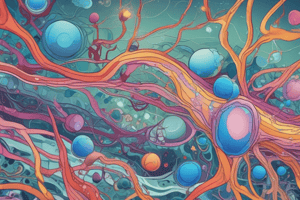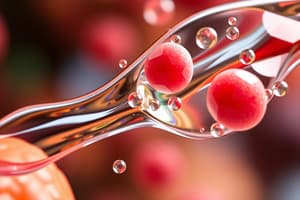Podcast
Questions and Answers
What happens to a cell in a hypotonic solution?
What happens to a cell in a hypotonic solution?
- It becomes rigid
- It shrinks
- It stays the same
- It swells (correct)
What is the effect of an isotonic solution on a cell?
What is the effect of an isotonic solution on a cell?
- It causes the cell to shrink
- It causes the cell to burst
- It causes the cell to swell
- It doesn't change the shape of the cell (correct)
What is osmosis?
What is osmosis?
- Endocytosis
- Diffusion of water (correct)
- Movement of solutes
- Active transport of substances
What occurs in a hypertonic solution?
What occurs in a hypertonic solution?
What is a channel protein?
What is a channel protein?
Energy is used during active transport but not during passive transport.
Energy is used during active transport but not during passive transport.
Define endocytosis.
Define endocytosis.
What is passive transport?
What is passive transport?
What is exocytosis?
What is exocytosis?
What is facilitated diffusion?
What is facilitated diffusion?
Define active transport.
Define active transport.
What is a carrier protein?
What is a carrier protein?
What defines osmosis?
What defines osmosis?
What occurs during passive transport?
What occurs during passive transport?
What is required during active transport?
What is required during active transport?
What does equilibrium mean in a biological context?
What does equilibrium mean in a biological context?
What happens during exocytosis?
What happens during exocytosis?
Define endocytosis in the context of amoeba feeding.
Define endocytosis in the context of amoeba feeding.
What is diffusion?
What is diffusion?
Flashcards are hidden until you start studying
Study Notes
Cell Transport Concepts
- Hypotonic Solution: Causes cells to swell due to water influx as the external solution has a lower solute concentration than the cell's cytoplasm.
- Isotonic Solution: Maintains cell shape since the solute concentration is equal inside and outside the cell, leading to no net movement of water.
- Hypertonic Solution: Causes cells to shrink as water moves out of the cell due to higher solute concentration outside.
Osmosis and Transport Mechanisms
- Osmosis: Refers to the specific diffusion of water across a semipermeable membrane, influenced by solute concentrations.
- Facilitated Diffusion: A type of passive transport utilizing transport proteins, allowing specific particles to cross the cell membrane without energy use.
- Passive Transport: Movement of particles from areas of higher concentration to lower concentration, occurring without energy expenditure.
Active Transport Processes
- Active Transport: Movement of particles against their concentration gradient from lower to higher concentration, requiring energy expenditure.
- Endocytosis: Process where cells engulf external material, forming a vacuole; facilitates nutrient intake (e.g., how amoebas consume food).
- Exocytosis: Mechanism for expelling waste or material from the cell where a vacuole fuses with the plasma membrane, releasing its contents.
Specialized Proteins
- Channel Protein: Transmembrane proteins forming tube-like openings in the plasma membrane for specific particle diffusion.
- Carrier Protein: Transport proteins that undergo conformational changes when binding particles, facilitating their movement across the membrane.
Additional Concepts
- Equilibrium: Achieved when concentrations of molecules are evenly distributed across a space, indicating balanced states.
- Energy in Transport: Active transport distinguishes itself from passive transport by requiring energy, while passive processes rely on concentration gradients.
Important Definitions
- Diffusion: General movement of molecules from high to low concentration without energy.
- Passive Transport: Entry or exit of substances through the cell membrane without energy use.
- Active Transport: Movement requiring energy for transporting materials across cell membranes.
These concepts provide essential understanding of cell transport mechanisms, highlighting how cells maintain homeostasis and exchange materials with their environment.
Studying That Suits You
Use AI to generate personalized quizzes and flashcards to suit your learning preferences.




